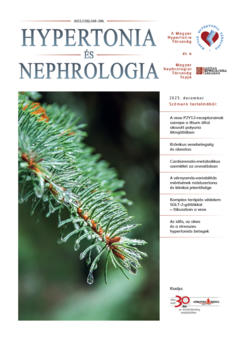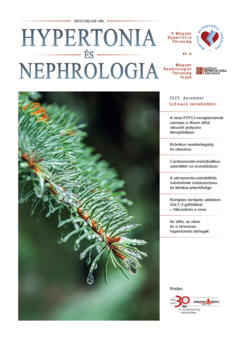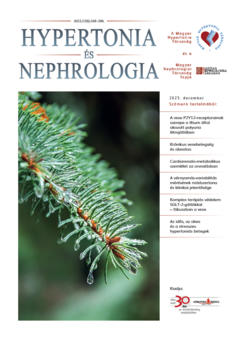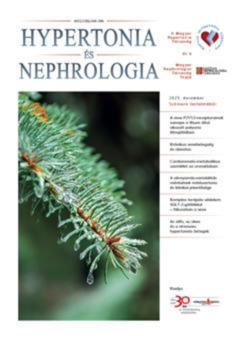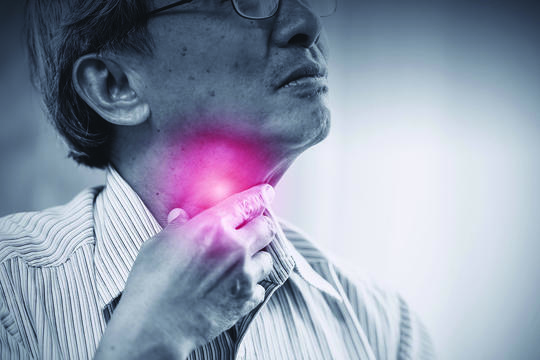The eLitMed.hu medical portal uses computer cookies for convenient operation. Detailed information can be found in the Cookie-policy.
Specialities
Endocrinology
[Chronic kidney disease and obesity]
[Nowadays, the epidemic spread of obesity is mainly linked to changing environmental factors and is a serious public health problem. Obesity alone can be associated with increased mortality, but obesity is also an independent risk factor for several chronic diseases such as diabetes, hypertension and chronic kidney disease which have a major public health burden.]
[Cardio-renal-metabolic approach in medicine – thoughts, considerable information based on the new recommendations regarding SGLT2 inhibitors and GLP1 receptor agonists]
[Common complications of type 2 diabetes are chronic kidney failure and chronic heart failure. However, chronic renal failure and chronic heart failure can contribute to the development and deterioration of each other, and can be present earlier and more severely in the case of diabetes. Furthermore, type 2 diabetes might also occur more frequently in case of chronic kidney- and heart failure. All of these are often accompanied by atherosclerotic cardiovascular disease and hypertension.]
[Role of renal P2Y12 receptors in lithium-induced polyuria]
[Clinicians and investigators know since ages that increased production of prostaglandins play a significant role in the pathogenesis of polyuria of patients with Bartter syndrome.]
[Hypothyroidism of the elderly – To treat or not to treat? ]
[Hypothyroidism is common in the elderly. Frequent causes of hypothyroidism include autoimmune disease of the thyroid gland, previous thyroid surgery and radioiodine therapy. Symptoms may be atypical, and the level of serum thyroid-stimulating hormone (TSH) must be measured as a part of the biochemical workup. Elevated serum TSH levels have to be confirmed with a repeated tests, which must be completed by measuring the serum thyroxine level too. The recommended and relevant replacement therapy for hypothyroidism is levothyroxine sodium administration. Levothyroxine sodium is orally only partially absorbed since it is affected by food, minerals, drugs and the composition of the tablet. The initial hormone replacement dose should be low if any heart disease is suspected. The main risk of levothyroxine sodium therapy is its over supplementation, the side effects of which may include anxiety, muscle atrophy, osteoporosis, and atrial fibrillation. Subclinical hypothyroidism with elevated serum TSH level but with a T4 level in its reference range may be considered as a mild form of hypothyroidism. Studies published so far did not prove the positive effect of substitution therapy for non-goitrous subclinical hypothyroidism, especially in elderly patients.]
[Gynaecological hormone therapy and the cardiovascular risk. Part 1: hormonal contraception]
[Preventing unwanted pregnancy, and in treating many gynaecological diseases, we use hormones produced by the ovaries, namely the follicle hormone and the corpus luteum hormone, or their synthetic versions. In terms of hormonal therapies, combined oral hormonal contraception and menopausal hormone therapy are of outstanding importance. Some pharmaceuticals do not increase the cardiovascular (CV) risk, while others do it by increasing the risk of coronary diseases (primarily myocardial infarction), venous thromboembolism, and ischaemic and haemorrhagic strokes respectively. This review of concerning literature summarized the cardiovascular impact of hormonal therapies in gynaecologic practice, in two parts. The first part discusses hormonal contraception, the second one the menopausal hormone therapy.
Combined hormonal contraceptives (COC) containing follicle hormone and progestogen significantly increase the risk of venous thromboembolism (VTE), however without any major clinical significance. The higher risk perceived among smoking, overweight and older women is additionally burdened by COC. Nevertheless, products containing estetrol and progesterone-only-pills do not increase the CV risk. Using COC does not increase the risk of haemorrhagic stroke, but does it slightly that of ischaemic stroke and myocardial infarction. CV side effects of hormonal ACs are not significant from a clinical point of view and are far below the complications caused by unwanted pregnancies due to the use of improper contraception. This study summarized the literature data on CV risk of hormonal contraceptives. ]
1.
Clinical Neuroscience
[Headache registry in Szeged: Experiences regarding to migraine patients]2.
Clinical Neuroscience
[The new target population of stroke awareness campaign: Kindergarten students ]3.
Clinical Neuroscience
Is there any difference in mortality rates of atrial fibrillation detected before or after ischemic stroke?4.
Clinical Neuroscience
Factors influencing the level of stigma in Parkinson’s disease in western Turkey5.
Clinical Neuroscience
[The effects of demographic and clinical factors on the severity of poststroke aphasia]1.
2.
Clinical Oncology
[Pancreatic cancer: ESMO Clinical Practice Guideline for diagnosis, treatment and follow-up]3.
Clinical Oncology
[Pharmacovigilance landscape – Lessons from the past and opportunities for future]4.
5.
